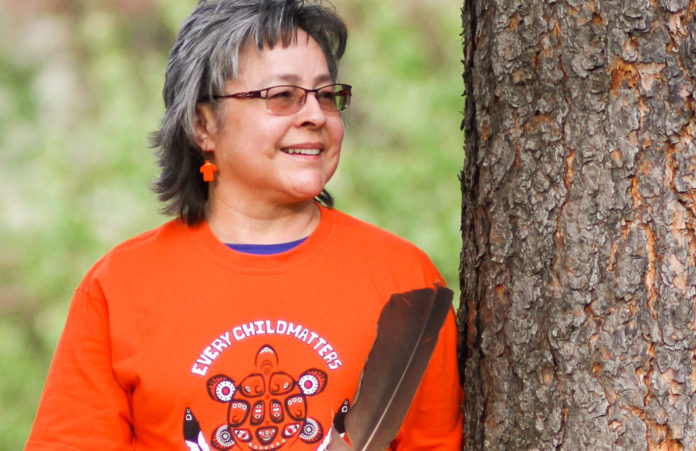Phyllis Webstad spoke on the National Day for Truth and Reconciliation, Sept. 30, at 11:30 a.m. at the Fraser Valley Heritage Park in Mission. The Heritage Park is on the grounds right behind where she attended the former St. Mary’s Indian Residential School.
Webstad is a third-generation residential school survivor and the creator of Orange Shirt Day; a day of remembrance in Canada to commemorate and honour Indigenous children who experienced residential schools. Webstad published a book called Beyond the Orange Shirt Story, which tells the story of three generations of her family and was released Sept. 1, 2021.
The National Day of Truth and Reconciliation is a federal statutory holiday for the first time in 2021. The holiday was approved by Parliament on June 5, after Bill C-5 received royal assent after passing unanimously in the Senate. The event encourages Canadians to learn more about the ongoing impacts and history of residential schools.
At the event, Webstad talked about her book Beyond the Orange Shirt Story and discussed the collection of stories from her family and friends before, during, and after residential school. The event gave people a close-up view of what life was for many survivors before and after their residential school experiences.
Orange Shirt Day honours how Webstad had her orange shirt taken away from her on her first day of residential school. Residential schools were church-run, government-funded schools that functioned between 1831 and 1997. More than 150,000 Métis, Inuit, and Indigenous children were forced to attend these residential schools.
“I remember lots of crying and the feeling of terror, pee-your-pants terror, when my clothing, including my new orange shirt, was taken. It didn’t matter how much I protested or told them I wanted it back. They didn’t listen,” said Webstad.
At the event, Agnes Jack, aunt to Webstad, said, “The priests and the nuns, they made us believe that they were doing good things for us, especially the priests and the brothers.”
Jack compared residential schools to prison: “I thought my heart just seemed to jump in my throat. I got all choked up thinking I am going to prison. Someone must have told me what prison was about when I was little, and I could feel my heart just beating and wondering what I was coming to.”
Children at residential schools were physically, psychologically, and sexually abused.
“I thought the church, the pope, the head of the Catholic church, should have apologized for what had taken place because that is who was creating — was abusing and hurting emotionally, physically, spiritually, mentally hurting the children here in the school and, it seems, having no conscience about it. I thought the church should have apologized as well,” said Jack.
The Department of Canadian Heritage encourages Canadians to learn, reflect, and educate themselves on the legacy of residential schools. UFV was closed on Sept. 30 to allow employees and students to attend events related to truth and reconciliation. Sept. 30 is now known as the National Day for Truth and Reconciliation, to recognize those who survived residential schools and remember those who did not.
Image: UFV Flickr
Valentina Betancourt is a third-year psychology major/political science minor who is the News Editor at The Cascade. Her dream is to become an immigration Lawyer as she immigrated from Bogota, Colombia.


